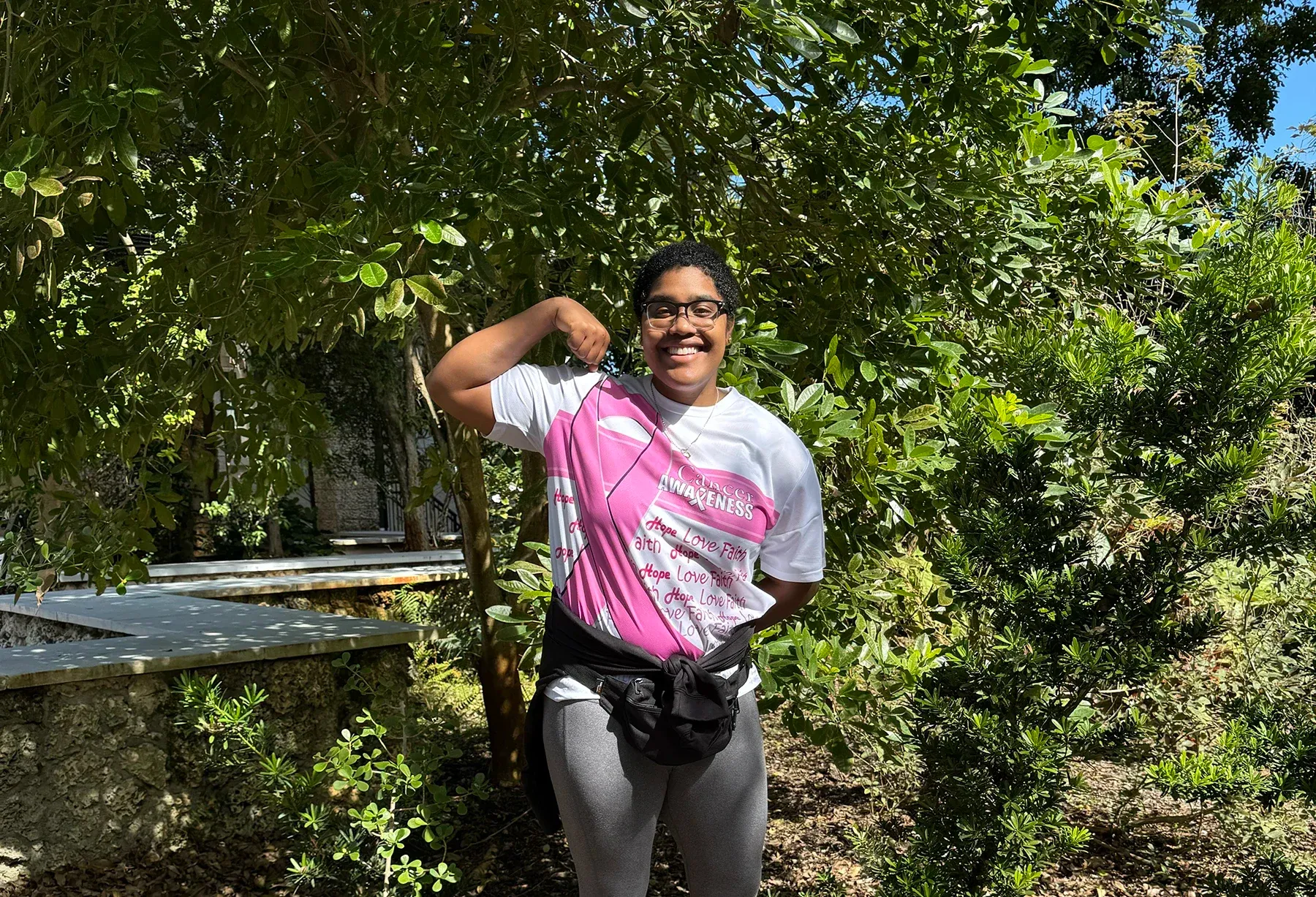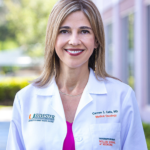Eat Smart, Move More — Slash Your Cancer Risk

LaShae Rolle seemed like the last person who’d be at risk for cancer: she was young, had no family history, exercised regularly, didn’t smoke and didn’t drink alcohol. So Rolle’s diagnosis of breast cancer at age 26 came as a shock.
Her healthy habits turned out to be crucial to helping Rolle thrive through her cancer treatment and recovery.
“I truly believe that exercise, along with increasing my fruit and vegetable consumption, helped me out,” she says.
Rolle bought a juicer during her treatment and works to incorporate fruits and vegetables into every meal. She’s also continued with her powerlifting regimen, along with running and biking.

Carmen Calfa, M.D., Rolle’s breast cancer medical oncologist and medical co-director of the cancer survivorship program at Sylvester Comprehensive Cancer Center, part of the University of Miami Health System, recommended the center’s Lifestyle Medicine Program alongside all breast cancer treatment modalities.
“At Sylvester, our patients receive comprehensive care throughout their journey. When a diagnosis is made, we ensure they are connected to the necessary support programs to optimize their outcomes,” says Dr. Calfa. “Our teams collaborate closely, not only to develop a comprehensive multidisciplinary treatment plan but also to employ a holistic approach to maximize emotional, spiritual and physical health throughout the cancer care continuum. We focus on treating the whole person, and our approach is rooted in research and guided by our expertise as physician-scientists.”
Lifestyle medicine can improve cancer outcomes.
Cancer treatment is a taxing experience on all levels. Witnessing changes in appearance, like hair loss, weight fluctuations and surgical alterations, can be emotionally challenging. Physically, patients can often experience “chemo fatigue,” which leaves them feeling drained and exhausted.
Although grappling with such difficulties might be an inevitable aspect of the process, in Rolle’s experience, patients do have some control over how they respond to treatment.
“I know that, even though I can’t find an answer for my cancer diagnosis, what I do know is that diet and exercise can help me prevent recurrence,” says Rolle, who is a University of Miami Miller School of Medicine Ph.D. candidate. “And so, if there’s anything I can do to help prevent recurrence, I’m going to go ahead and do it.”
Doctors would agree with Rolle. Evidence is mounting that attention to diet and exercise before, during, and after cancer treatment helps improve treatment outcomes and prevent the recurrence of cancer. This can come in several forms.
Dietary interventions can help those with high genetic cancer risk.

Research shows that dietary interventions can help even those who are at high genetic risk for cancer, according to Paola Rossi, M.D. M.S.E.D., clinical program director of lifestyle medicine at Sylvester.
“We know that genetic mutations play a huge role in cancer development, but we also know that 40% of all cancer diagnoses are attributed to lifestyle decisions, mainly diet, weight, exercise, and tobacco,” she says.
Eating a predominantly plant-based diet high in protein, fruits, vegetables and healthy fats can reduce inflammation, which tends to exacerbate issues throughout the body and can ultimately lead to increased cancer risk.
“It’s always about balance,” says Dr. Rossi. “If a patient has a genetic mutation, I emphasize weight management and eating healthy because I know that will help them. We can’t change someone’s genetics, but we can definitely work on changing those everyday things we do.”
For patients at a higher risk of developing cancer, Sylvester, which is South Florida’s only National Cancer Institute-designated cancer center, offers the High-Risk Lifestyle Medicine, Prevention and Digital Health program. Sylvester’s Genetic Predisposition Syndrome (GPS) Clinic, supported by the Eileen Youtie Hereditary Predisposition Initiative, offers personalized care for individuals with an inherited risk of cancer. A key feature of the clinic is access to a dedicated health coach who assesses each patient’s lifestyle habits and motivations and then works collaboratively to support meaningful changes in diet, physical activity and other behaviors that can reduce cancer risk.
Diet and exercise make a difference from cancer diagnosis throughout survivorship.
For patients who have been diagnosed with cancer, improvements to diet and exercise regimes start during treatment.
“While we always want to know what happens after treatment, there’s newer research on what happens during treatment that’s investigating what we eat and how we move during treatment and the impact on treatment outcomes, including symptoms like fatigue and GI disturbances that could limit the amount of treatment someone receives,” Dr. Rossi says.
Positive changes in diet and exercise can also help relieve complex treatment side effects. Nausea, vomiting, and other GI disturbances, as well as changes in taste and smell, can all lead to patients losing muscle, which in turn can lead to poor recovery outcomes.
“Muscle mass is really important for survivorship,” says Dr. Rossi. “Diet and exercise are the things we find that can help that. When we have a diet fueled with lean protein, healthy fats and nutrients to support increasing muscle mass, as well as exercise during or after treatment, this can have a huge impact on survivorship.”
After active treatment has ended, healthier eating can often significantly reduce the chances of cancer coming back or of a new cancer developing.
Evidence shows that even increasing fruit consumption to five servings per day post-treatment, increasing daily activity and being at a healthy weight can reduce the chances of cancer coming back by a whopping 40% (the 40% is for all the health behaviors combined, notes Dr. Crane).
“As our director of lifestyle medicine, prevention and digital health, Dr. Crane always says, if you think about this as a medication, it would be the bestselling treatment in the world because few medications can provide those kinds of results. That’s how powerful diet is to survivorship,” Dr. Rossi says.
Eating Well to Reduce Cancer Risk and Improve Treatment Outcomes
The American Cancer Society recommends a predominantly plant-based diet that includes lean proteins, whole grains, healthy fats, and lots of fruits and vegetables. Perhaps the best way to eat healthy is to prepare for it. As Tracy Crane, Ph.D., R.D.N., Sylvester’s director of lifestyle medicine, prevention and digital health, says, “You are going to eat what you have in your pantry and your refrigerator, so have healthy choices ready and available.”
Keep these healthy foods available.
- Cruciferous vegetables and leafy greens, like kale, cauliflower, broccoli, cabbage, spinach and bok choy
- Lean proteins, such as skinless chicken, fatty and white-meat fish, shrimp, eggs, beans, tofu (yes, cancer survivors can eat tofu), cottage cheese, Greek yogurt, and nondairy or dairy milk
- Fresh berries, blueberries, raspberries, strawberries, and even try something new like gooseberries!
- Other vegetables such as carrots, peppers, eggplant, and asparagus
- Frozen fruits
- Frozen vegetables
- Lean meats
- Fish
- Dried or canned beans, such as black beans, kidney beans and lentils
- Spices like turmeric, cinnamon, ginger and red pepper flakes
- Whole grains like wheat bread, tortillas, oatmeal, quinoa or brown rice
- Nut butters
- Fruits, especially apples, bananas, as well as oranges, tangerines or clementines, and melons
- Guava, mango and papaya, if you’re in South Florida
- Sweet potatoes
- Avocados
- Tomatoes
- Garlic
- Red and yellow onions
- Healthy fats, including olive oil and avocado oil
- Nuts and seeds, such as flax, sunflower seeds, almonds, walnuts, pecans
- Coffee and tea
- Already-cooked whole grains, such as rice or quinoa, can be the basis of a weeknight meal
- Beans cooked from dry or low-sodium canned beans for easily adding protein to meals and salads
- Vegetables and fruits, washed and cut
- Spreads to use in sandwiches, wraps or salads, such as hummus, yogurt with lemon, edamame or yogurt dip
- Nuts and seeds for snacking or to sprinkle on soup or salad
- Whole-grain breads or tortillas
Written by Jodie Nicotra for Sylvester Comprehensive Cancer Center.
Tags: Cancer prevention strategies, Dr. Carmen Calfa, Dr. Paola Rossi, Dr. Tracy Crane, Genetic cancer risk management, holistic cancer care, Plant-based diet and cancer, Sylvester Comprehensive Cancer Center
